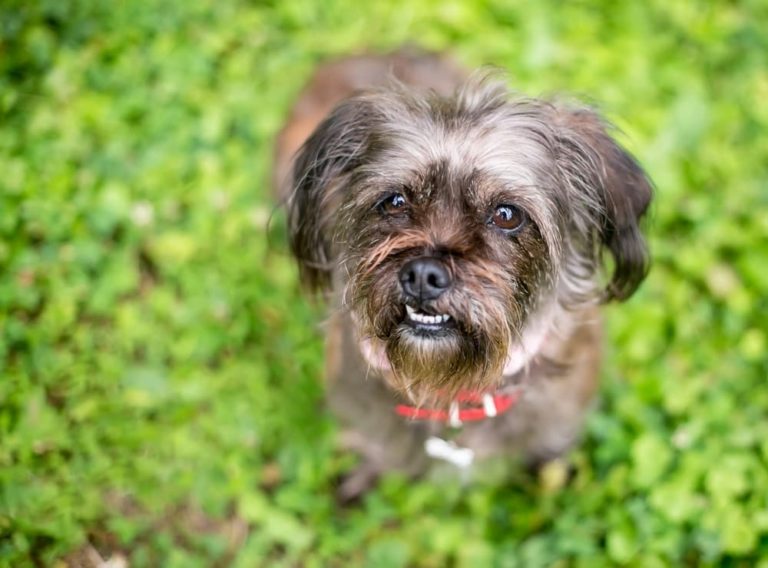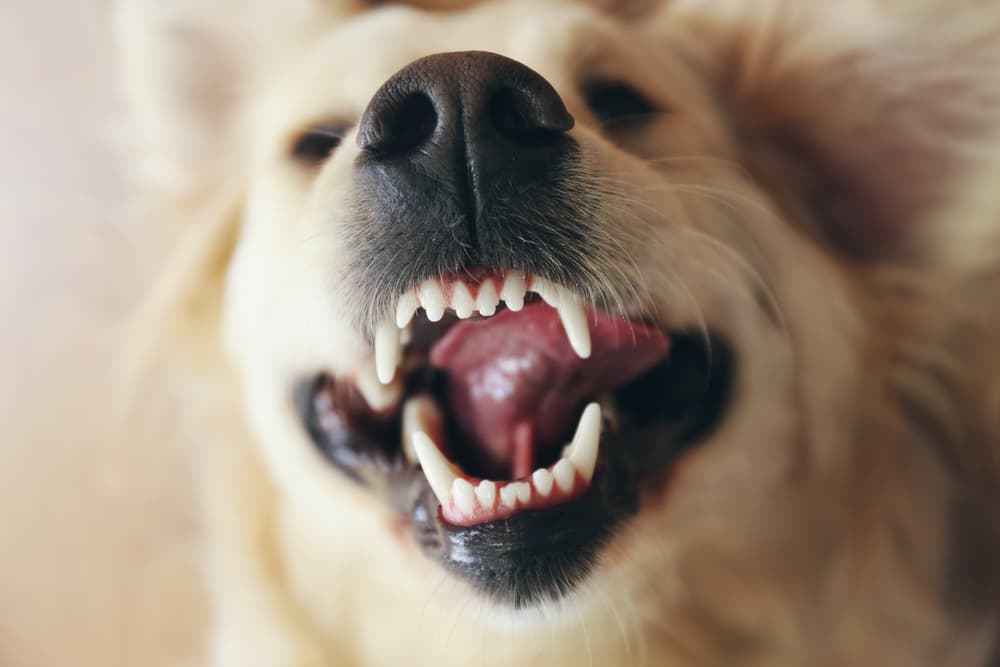Dog Teeth Chattering: Causes and What It Means

Your dog’s jaw starts to shake. Their teeth might even tap together. Is your dog feeling cold, which is a common reason humans chatter their teeth? Or is something else happening?
Aside from being cold, there are other potential reasons for teeth chattering in dogs, such as smelling something interesting or, in some cases, an underlying health problem.
Let’s take a closer look at what causes dog teeth chattering—and what to do about this behavior.
What Is Dog Teeth Chattering?
So, what exactly is teeth chattering in dogs, and what does it look like? This depends on how you define teeth chattering, says Dr. Nicholas Dodman, a professor emeritus at Tufts University and the chief scientific officer at the Center for Canine Behavior Studies.
To Dr. Dodman, teeth chattering is what happens when a dog smells something new and exciting, like urine from another dog. The movement of the dog’s jaw helps move chemical signals from the smell to the vomeronasal organ—also called the Jacobson’s organ—in the roof of their mouth, allowing them to supercharge their sense of smell. This is called a Flehmen response.
“Chattering has something to do with tasting, smelling, appreciating certain foreign materials, notably other dogs’ excretions or other interesting smells like bits of dead animal or an old piece of rotten chicken on the side of the road,” Dr. Dodman says.
Dr. Dodman says that when chattering is part of a Flehmen response, a dog might briefly quiver their jaw while sniffing or licking. They might even appear like they’re about to yawn. They probably won’t tap their teeth together. Most of these episodes only last about 30 seconds—sometimes too quick for you to see, he adds.
But dog teeth chattering can also be defined another way. Dr. Roxanne LeBrun, a veterinarian at Best Friends Animal Society, a leading U.S. animal welfare organization, describes it as “an involuntary movement caused by contractions in the muscles used for mastication,” which can happen in response to dental pain, neurologic issues, or even anxiety.
In these situations, you might literally hear your dog’s teeth tap together as their jaw shakes. “It is a pretty obvious motion of the mouth, and you can often hear the teeth tapping against each other,” says Dr. LeBrun.
Causes of Dog Teeth Chattering

Veterinary experts say several things can cause teeth chattering in dogs, including:
- Flehmen response
- Dental disease, which can affect the teeth, gums, and tissues
- Neurologic issues such as seizures
- A neurodegenerative disease that affects the nerves controlling the jaw muscle
- Anxiety or fright
- Cold temperatures
So how can you tell if your dog’s teeth chattering is a response to something stinky and interesting—or an underlying health problem? Dr. Pieter Vanacker, a veterinary surgeon at AniCura Veterinary Center Anthemis in Kapelle-op-den-Bos, Belgium, says you must assess the situation and the dog’s overall behavior. In other words, get the context.
“It’s very important at that moment to see what the dog is doing,” Dr. Vanacker says. “What are the circumstances in which he starts doing that? So, for example, when you go for a walk with the dog, he’s going to sniff the environment, and he’s starting to shiver his teeth, it’s possible he found something he likes. But if it happens around the moment he wants to eat, it’s possible that he has a tooth [issue] and eating hurts him a little.”
Dr. Vanacker says if you see your dog chattering their teeth more than usual, or if you notice anything unusual about his behavior, it might be worth taking your dog to the veterinary clinic.
Should You Worry About Teeth Chattering in Dogs?
In many cases, you don’t need to worry about dog teeth chattering, especially if your dog seems to do it while sniffing or licking something.
However, one situation in which you should take teeth chattering very seriously is when a dog is suddenly not responding to you, says Dr. Vanacker. In these situations, your dog may be experiencing a focal seizure. If you notice your dog chattering their teeth or biting at the air for no apparent reason, contact a veterinarian to rule out focal seizures.
And of course, if you think your dog is suffering due to an issue like dental pain or anxiety, you should also contact your veterinarian.
What to Do About a Dog’s Chattering Teeth

In most cases, teeth chattering in dogs does not indicate a serious issue that requires a trip to the emergency clinic. But if you’re still concerned, carefully document what’s happening so you can discuss the behavior with your veterinarian.
“If you notice teeth chattering, it’s a good idea to make a mental note of the conditions it’s occurring in and the generalized demeanor of your dog,” says Dr. LeBrun. “Ask yourself questions like: Are they in an unfamiliar or scary environment? How is the ambient temperature? Do they respond to you speaking or petting them?
“Another very helpful thing you can do is try to capture the episode on video to share with your veterinarian,” she adds. “It may provide hard-to-describe details that help your veterinarian identify how concerned to be about the behavior and where to direct their physical exam.”
If your dog turns out to be suffering from dental issues, neurological problems, anxiety, or another condition, your vet will be able to provide advice on what to do. For instance, your veterinarian might advise a professional dental cleaning to address any oral health issues, or to consult a dog behavior expert for ways to ease your dog’s anxiety. If you tackle the root of the issue, a dog’s teeth chattering might completely disappear.









